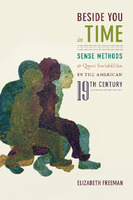Beside You in Time
Sense methods and queer sociabilities in the American nineteenth century

Download Url(s)
https://library.oapen.org/bitstream/20.500.12657/24048/1/9781478090045-web.pdf---
https://library.oapen.org/bitstream/20.500.12657/24048/1/9781478090045-web.pdf
---
https://library.oapen.org/bitstream/20.500.12657/24048/1/9781478090045-web.pdf
Author(s)
Freeman, Elizabeth
Collection
Toward an Open Monograph Ecosystem (TOME)Language
EnglishAbstract
In Beside You in Time Elizabeth Freeman expands biopolitical and queer theory by outlining a temporal view of the long nineteenth century. Drawing on Foucauldian notions of discipline as a regime that yoked the human body to time, Freeman shows how time became a social and sensory means by which people assembled into groups in ways that resisted disciplinary forces. She tracks temporalized bodies across many entangled regimes—religion, secularity, race, historiography, health, and sexuality—and examines how those bodies act in relation to those regimes. In analyses of the use of rhythmic dance by the Shakers; African American slave narratives; literature by Mark Twain, Pauline Hopkins, Herman Melville, and others; and how Catholic sacraments conjoined people across historical boundaries, Freeman makes the case for the body as an instrument of what she calls queer hypersociality. As a mode of being in which bodies are connected to others and their histories across and throughout time, queer hypersociality, Freeman contends, provides the means for subjugated bodies to escape disciplinary regimes of time and to create new social worlds.
Keywords
Literary Criticism; Semiotics & Theory; Social Science; Gender Studies; Social Science; Ethnic Studies/African American StudiesISBN
9781478006350; 9781478005049; 9781478005674Publisher
Duke University PressPublisher website
http://www.dukeupress.edu/Publication date and place
Durham, NC, 2019Classification
Linguistics
Literature: history and criticism
Gender studies, gender groups
Ethnic studies

